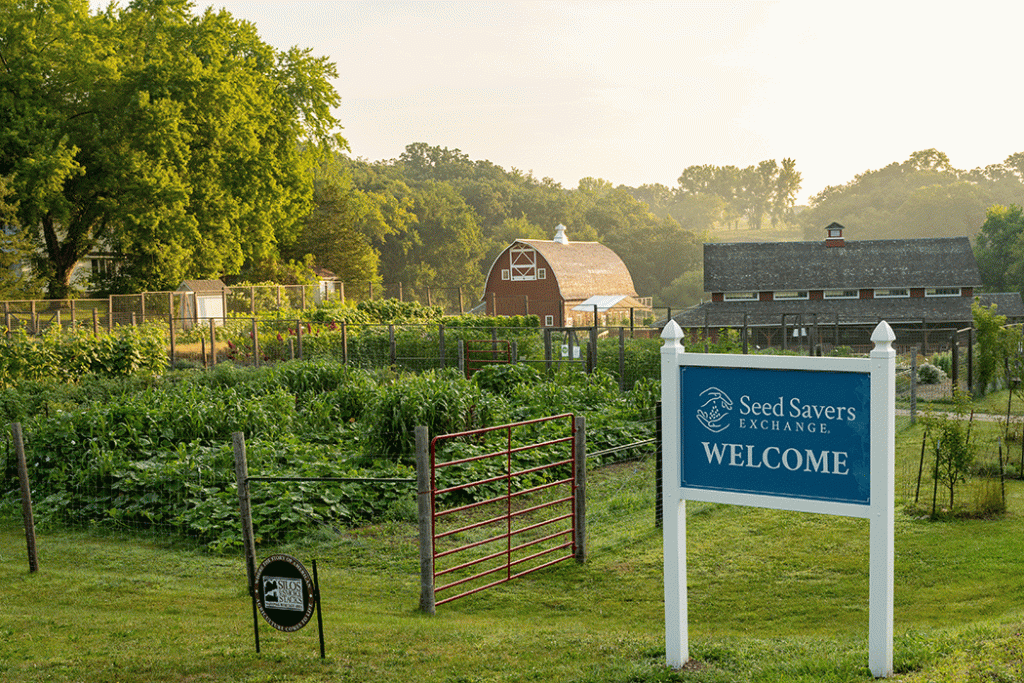
Iowa’s Seed Savers Exchange (SSE) is celebrating its milestone 50th anniversary this year. A community-based nonprofit famous for its huge collection of garden and food-crop heirloom seeds, SSE not only safeguards heirloom seeds for future generations, it also encourages gardeners and farmers across the world to grow and share heirloom seeds.
Founded in 1975 by Diane Ott Whealy and Kent Whealy, SSE began as a network of gardeners—now called the Exchange—interested in preserving heirloom varieties and bolstering biodiversity. Seed Savers started its collection with two varieties of seeds Diane’s grandfather had entrusted to them: Grandpa Ott’s morning glory and the German Pink tomato. Grandpa Ott’s parents had brought these seeds from Bavaria when they immigrated to Iowa in 1884.
Today, SSE houses the nation’s largest nongovernmental seed bank of its kind, with 20,000 varieties at its 890-acre Heritage Farm just outside of Decorah. The seed bank includes a wide variety of edible plants, from heirloom tomatoes, squash, and kitchen herbs to approximately 1,000 apple trees, more than 500 potato varieties, and over 200 garlic varieties.
Diane Ott Whealy says they have weathered ups and downs over the years by focusing on their original mission—saving seeds. “Seeds were always connected to people whose stories, no less than good soil and spring rains, brought those seeds to life,” she says. “We also have our Heritage Farm, a gift of nature that man could never replicate, a wild place where beauty and joy are accessible.”
Why Save Old Varieties?
Over the last century, the world has lost 75 percent of its edible plant varieties, as monocultures have become the norm. Being dependent on a handful of food crops creates a fragile agricultural system. Monoculture negatively impacts soil fertility and biodiversity, and is often more vulnerable to disease.
Having access to a diversity of seeds increases agricultural biodiversity and protects our food system. Planting a larger number of crop varieties ensures that some will adapt to changing climate conditions and some will have higher disease resistance.
Heirloom seeds can only be preserved through active stewardship. If they are not used and grown, they are lost.
The SSE seed bank includes truly priceless varieties of heirloom and open-pollinated seeds, many of which have family stories attached to them, as they were connected to a family member’s immigration or have become integral in tasty family recipes. This irreplaceable genetic resource contributes to the security of our food supply. SSE also backs up their seed collection at the Svalbard Global Seed Vault in Norway, further ensuring that these heirloom seeds do not disappear.
Seeds for Home Gardeners
SSE sells over 600 varieties of heirloom seeds through their annual seed catalog and online shop. Revenue from seed sales as well as donations and memberships help maintain the organization. Many heirloom seeds now available to home gardeners were shared first on the Exchange.
What began as a newsletter connecting area gardeners willing to share heirloom seeds is now an online gardener-to-gardener seed swap. Thousands of gardeners use the Exchange, which is open to the public. Some SSE seeds are also available at local gardening supply and natural food stores. Exchange members and home gardeners using SSE seeds have saved thousands of rare heirloom plants from extinction.
Classes and Conferences
SSE also provides information on gardening and seed saving, offering educational classes and workshops as well as farm tours. It has a number of exciting events planned over the year to celebrate its 50th anniversary, from seed swaps and tree-grafting classes to farm tours, tomato tastings, orchard tours, and conferences. Many activities are free.
But the biggest event of the year is SSE’s 50th Anniversary Conference and Celebration, August 8–9. The festivities will include speakers, farm tours, workshops, a seed swap, and live music—all to honor the accomplishments of its dedicated founders and volunteers.
“Together, we have built a strong foundation with passion, hard work, and often limited resources,” says Ott Whealy. “We are poised to be stronger and more influential for the next 50 years. But it is not enough to just steward beauty—we must strive to continue to promote and preserve it as well.”
For more information, visit SeedSavers.org.
